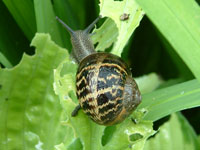Slugs and snails – where many a gardener fails
 Slugs and snails are going about the rather serious business of eating to live. They have no awareness of human aesthetic and culinary needs. Standing on them, dehydrating them in salt or poisoning them is cruel punishment. You may even wrongly convict one of the many species that eat only rotting vegetation.
Slugs and snails are going about the rather serious business of eating to live. They have no awareness of human aesthetic and culinary needs. Standing on them, dehydrating them in salt or poisoning them is cruel punishment. You may even wrongly convict one of the many species that eat only rotting vegetation.
Infecting them with nematode worms is an unpleasant but natural method where culling is deemed essential.
NB. Google may serve up ads for 'slug killers' due to the presence of the word 'slug' in this post.
| For more wildlife gardening advice, ebooks, information, projects and jokes please visit: www.thewildlifegarden.co.uk |



0 Comments:
Post a Comment
<< Home